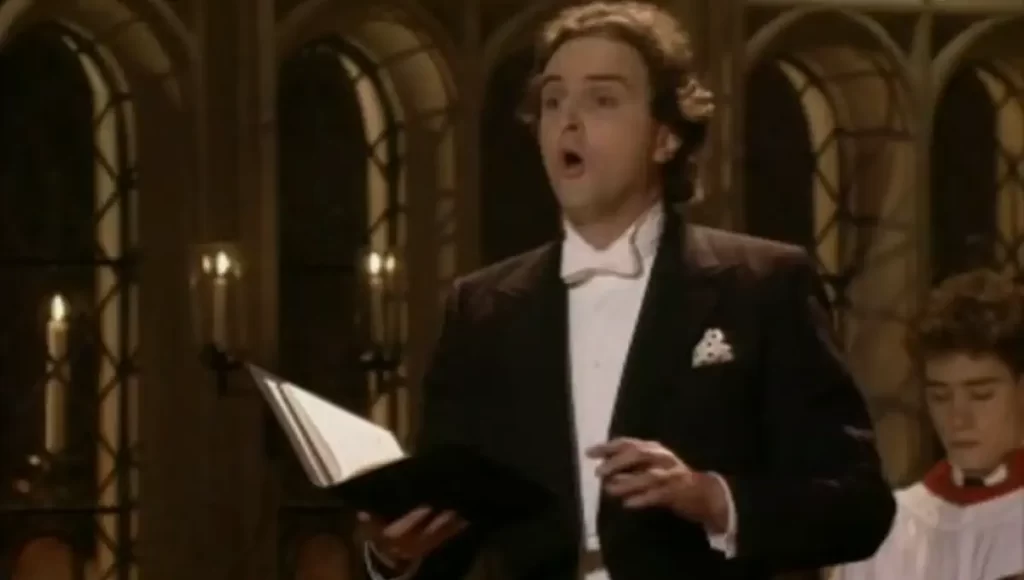French classical and opera singer (contralto) and conductor Nathalie Stutzmann records “Erbarme Dich” from Johann Sebastian Bach’s Matthäus-Passion (St. Matthew Passion, BWV 244) at Metz Arsenal. Orfeo 55, the chamber orchestra founded by Stutzmann herself accompanies her during the recording. This piece features in their album “Une Cantate Imaginaire” released in 2012. Video by OFF TV.
St. Matthew Passion
The St. Matthew Passion (German: Matthäus-Passion), BWV 244 is a Passion, a sacred oratorio written by Johann Sebastian Bach in 1727 for solo voices, double choir, and double orchestra, with libretto by Picander (Christian Friedrich Henrici).
It sets chapters 26 and 27 of the Gospel of Matthew (in the German translation of Martin Luther) to music, with interspersed chorales and arias. It is widely regarded as one of the masterpieces of classical sacred music. The original Latin title Passio Domini nostri J.C. secundum Evangelistam Matthæum translates to “The Passion of our Lord J[esus] C[hrist] according to the Evangelist Matthew”.
Erbarme Dich
“Erbarme dich, mein Gott” is one of the most poignant and celebrated arias from Johann Sebastian Bach’s St. Matthew Passion (BWV 244), a monumental work that holds a significant place in the canon of sacred classical music. This aria, typically performed by a solo alto voice accompanied by a violin obbligato, along with the continuo and the rest of the ensemble, stands out for its emotive depth and musical complexity, embodying the sorrow and pleading for mercy in the aftermath of Peter’s denial of Christ.
The text of “Erbarme dich” translates to “Have mercy, my God, for the sake of my tears” and is a direct appeal to God for compassion and forgiveness. The aria is set in the context of the Passion narrative, specifically after Peter realizes he has denied knowing Jesus three times before the rooster crows, fulfilling Jesus’ prophecy of betrayal. This moment of realization and the subsequent remorse he feels is captured exquisitely by Bach in the music of this aria.
Musically, “Erbarme dich” is structured to enhance the emotional content of the text. The solo violin part, which opens the aria, introduces a theme full of expressive dissonances and melodic contours that suggest weeping, a motif that continues to intertwine with the vocal line throughout the piece. This interaction between the voice and violin not only creates a rich tapestry of sound but also emphasizes the dual nature of the plea for mercy-the personal, represented by the voice, and the divine, symbolized by the violin.
The harmony of the piece is notable for its use of minor modes, chromaticism, and poignant dissonances that resolve in unexpected ways, all of which serve to heighten the emotional intensity of the aria. The continuous bass line, or basso continuo, provides a grounding foundation that underscores the solo parts, adding to the overall sense of lamentation and appeal for forgiveness.
“Erbarme dich” is widely regarded as one of Bach’s most moving and beautifully crafted compositions. Its performance requires not only technical skill from the musicians but also a deep sense of empathy and emotional expression to convey the profound sorrow and beauty of the piece. It remains a favorite among audiences and performers alike for its ability to touch the heart and stir the soul through the sheer power of music.
The impact of “Erbarme dich” extends beyond its religious context, reaching listeners of all backgrounds through its universal themes of repentance, mercy, and the human condition. It exemplifies Bach’s mastery of musical expression and his ability to translate complex human emotions into sublime musical form, making it a timeless masterpiece that continues to resonate with people around the world.
German Text “Erbarme dich”
Erbarme dich, mein Gott,
um meiner Zähren willen!
Schaue hier, Herz und Auge
weint vor dir bitterlich.
Erbarme dich, mein Gott.
English translation “Have mercy”
Have mercy, my God,
for the sake of my tears!
See here, before you
heart and eyes weep bitterly.
Have mercy, my God.
Sources
- St Matthew Passion on Wikipedia
- Chopin: Scherzo No. 3 [İlyun Bürkev] - September 14, 2024
- César Franck: Violin Sonata [Argerich, Capuçon] - September 8, 2024
- Beethoven: Piano Sonata No. 23 “Appassionata” [Anna Fedorova] - September 7, 2024

